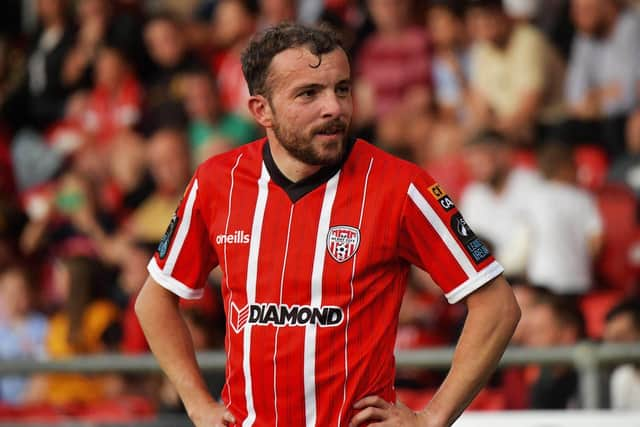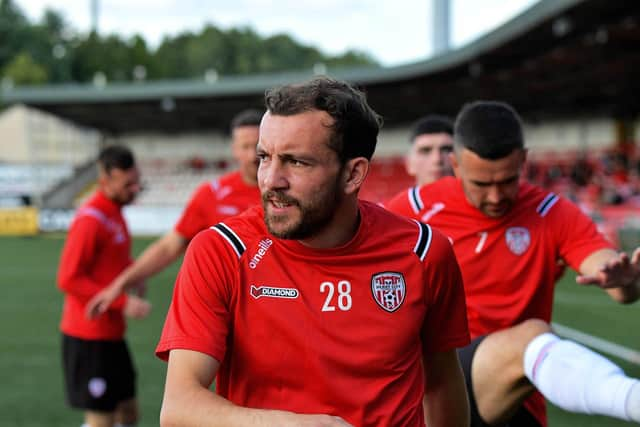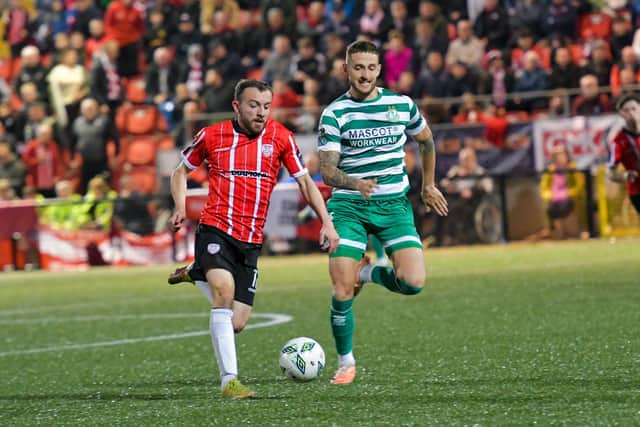Derry City winger Paul McMullan's battle with Type 1 diabetes hasn't held him back
and live on Freeview channel 276
The Scotsman was just 14 years-old when he was diagnosed with type-1 diabetes after displaying all the classic, persistent symptoms - losing weight, chronic fatigue and an insatiable thirst before he sought medical attention.
Adolescence can be daunting enough but when Paul had to inject himself with insulin four or five times a day it was difficult to come to terms with for a youngster already trying to 'figure out life'.
Advertisement
Hide AdAdvertisement
Hide AdThe life-long autoimmune disease prevents your pancreas from making insulin - a hormone essential for the absorption of sugars - and requires daily management with injections and blood sugar monitoring.
There are nearly 122,000 people living with diabetes in Northern Ireland. Fewer than one in 10 people with diabetes in the UK have type-1 and unlike type 2 - which is often induced by lifestyle factors - the exact causes of the condition are currently unknown. It's rare but extremely rare for professional footballers.
Spanish international Nacho Fernandez was one of the most famous who gave hopes to millions of people with type-1 when becoming the first person with the condition to score in the World Cup Finals against Portugal in Russia 2018.
Former Tottenham Hotspur and England defender Gary Mabbutt also has type-1 while McMullan's former Celtic teammate and current Larne midfielder Scott Allan was diagnosed with it when he was just three years-old.
Advertisement
Hide AdAdvertisement
Hide AdMcMullan, who went on to win the Scottish Championship twice, with Dundee [2022-23] and Dundee United [2019-20], has proven that having type-1 diabetes is no barrier to success in professional football. The ex-Scotland U21 international has spent the last 13 years living with it. He's learned to deal with the condition and it hasn't affected his game.


Indeed, he's been a revelation since Ruaidhrí Higgins convinced him to join Derry City last summer and he's been involved in four of the Brandywell club’s 10 goals this season already!
"I was in the middle of high school when I was diagnosed with it which wasn't particularly easy at that time when you're trying to figure out life as it is and then you get your condition and it does make life a wee touch more difficult," he explained.
"It's totally manageable now and it hasn't held me back from doing anything in life that I wanted to do. It's just figuring out what's the best way to manage it for you. Thankfully it's not going too badly for me at the moment."
Advertisement
Hide AdAdvertisement
Hide AdSo what were the early warning signs and how did he come to terms with the reality of living with diabetes?


"The symptoms? Before I realised or was diagnosed I was drinking a ridiculous amount of fluids and it felt like I had no energy at all," explained Paul.
"I went to the doctor and straight away they said; 'I think we know what this is' and I went to the hospital and started figuring out how to start dealing with the condition.
"Thankfully now it's well under control but the first couple of weeks are always difficult, especially having to inject four or five times a day as a 13 or 14 year-old."
Advertisement
Hide AdAdvertisement
Hide AdThe City wideman is an ambassador for Lochlan's Legacy - a charity set up by Scottish teenager Lochlan Murdoch who was just four years-old when diagnosed with type-1 diabetes. Since setting it up during Covid Lockdown, his charity work has raised over £10,000 to help children with the condition.


Paul hopes to do more for the charity and to raise awareness of the condition. His message is that being diabetic shouldn't stop you from fulfilling your dreams or doing anything to live a normal life. "It shouldn't stop you doing anything. I'm involved with diabetes awareness charity and Lochrum's legacy and that’s the message.
"I'm an ambassador for that charity. I can't get involved in events as much as I'd like with being over here but whenever I can help out I do my very best and when I get back to Scotland I will get back in amongst it more and do more bits and pieces on the ground."
Injecting insulin becomes a way of life for diabetics but it can be shocking or at least uncomfortable for others.
Advertisement
Hide AdAdvertisement
Hide Ad"I would go to the toilet to do my injections just because some people would have a fear of needles and you don't want to make people uncomfortable when you're injecting yourself.
"I've never hid the fact I've got the condition but I would normally take myself away when I'm doing my injections."
The soft spoken, laid back City winger takes it all in his stride and he explained how he monitors his blood glucose levels on training and match days as exercise and stress can cause it to fluctuate.


He's never had a 'hypo' - hypoglycemia or low blood sugar levels which can cause various adverse symptoms. However, he's experienced the opposite effect [hyperglycaemia] and one particular time he had to be taken off the pitch just 35 minutes into a match.
Advertisement
Hide AdAdvertisement
Hide Ad"I've had it go the opposite way whenever my sugar levels were a a bit too high. You don't feel like you have energy and you're dehydrated and that's just about getting your calculations or whatever wrong. Thankfully it hasn't happened too many times to me and, fingers crossed, it doesn't happen too often in the future.
"I had an instant in one game when my blood sugar levels were too high,” he recalled. “We were away in Wales so the travelling kind of messed up them up a wee bit and we had different food. “A couple of my teammates were like 'what is wrong with you?' just because of the way I was acting and I eventually had to come off after 35 minutes because I got it wrong for the first time.
"That was the first time in 10 years playing professional football that I had to come off because of it.”
By and large, Paul has managed to control his condition with his diet and the precise timing of his injections. It is a delicate balance between a demanding football career and managing type-1 diabetes.
Advertisement
Hide AdAdvertisement
Hide Ad"I would take my injections an hour and a half before the match. The insulin stays in your system for about four hours, so an hour and a half before kind of gives you a little grace period to make sure you don't start running out of whatever you need to keep your body going during a game. So that's more or less two and a half hours. Once the game has started that should take you through to extra-time if you need to.”
Amazingly the City attacker has turned his condition into a positive as he strikes a careful balance with his diet which allows him to perform to his optimum.
"Definitely, you have to be stricter with the things you're doing otherwise it can really affect you so you can't afford to.
"On match days it's about routine and getting food into you regularly so you can keep your sugars as you like them and eating at specific times so you have your insulin pumping through your body at the right time during the game when you're going to need it.
Advertisement
Hide AdAdvertisement
Hide Ad"The condition shouldn't affect how you go about the sport. If you manage it properly you could potentially have an advantage over other people because you know what you are eating and how it's all working and your sugars are perfect. You know you've calculated it all.
"There should be no fear or worry about the condition as long as you manage it properly and get on top of it.
"I've got it down to how I like it. On a match day I try to be pretty strict. The guys are great and thankfully I've been fairly good but I know if I ever need any help, the guys would be great and I'd be in safe hands.”